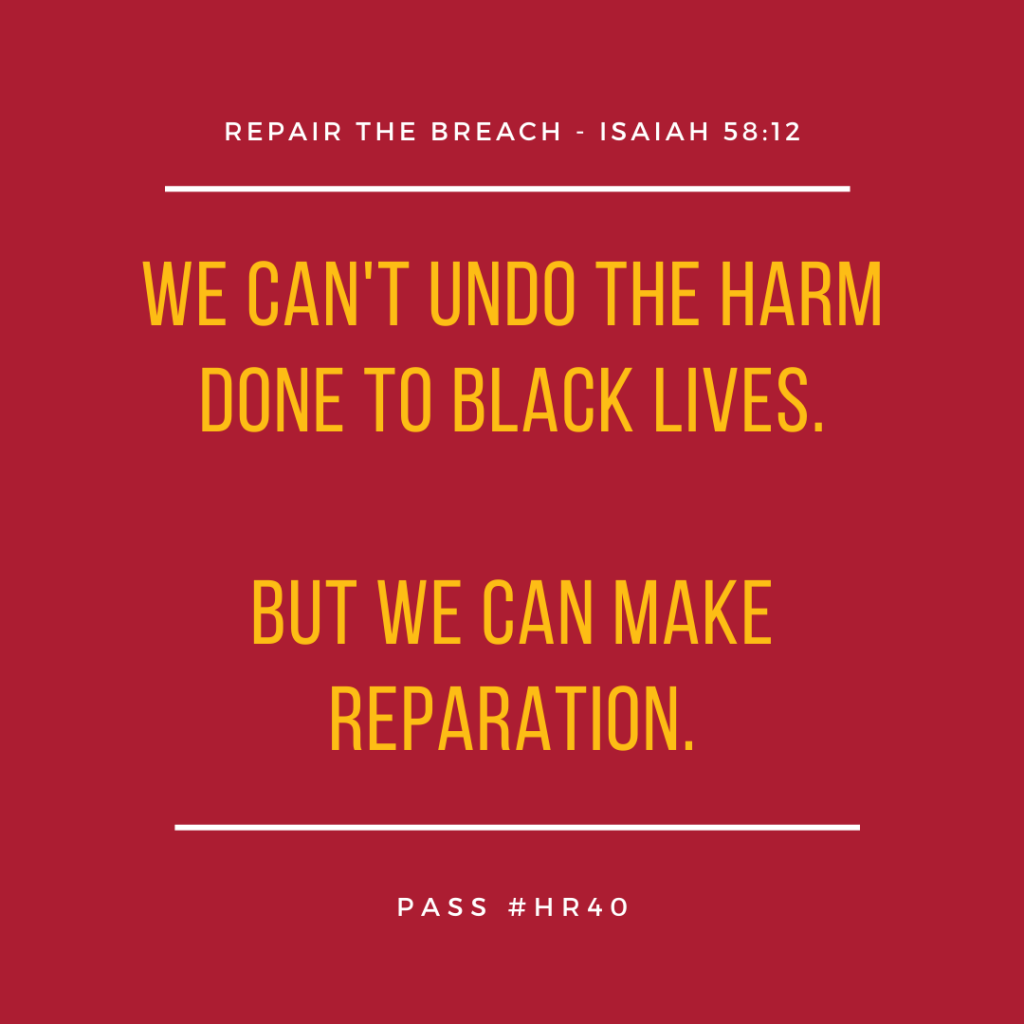UCC leaders laud historic legislation on reparations, heading to House vote
A piece of historic legislation, first considered decades ago, is heading to the U.S. House of Representatives for a vote. H.R. 40 would establish a commission to develop proposals and a “national apology” to help repair the lasting legacy of slavery.
The United Church of Christ and its ecumenical partners are strong supporters of the Commission to Study and Develop Reparations Proposals for African-Americans Act. It passed the House Judiciary Committee by a 25-17 vote late Wednesday, April 14. The bill was introduced for the first time in 1989 by the late Rep. John Conyers Jr. of Michigan.
“This country will never heal from the sin and evil of racism until we take seriously the important work of reparations,” said UCC General Minister and President John Dorhauer. “Let us finally tell the full truth about America’s racist past and present. Let us create pathways to the redistribution of wealth until damages are repaired and equity is ensured.”
History of UCC support

The Rev. Sekinah Hamlin, UCC minister for economic justice, quoted Isaiah 58:12. “As Christians we are called to ‘repair the breach’ of our past sins, not only by asking forgiveness, but by making redress for what was taken in the first place,” she said. “African-Americans are struggling today under the economic weight their collective past has unjustly placed upon them and their families, just like the descendants of once-enslaved people around the world. The time for reparations is now.”
Twenty years ago, at the 23rd General Synod, UCC delegates voted to call for a study on reparations for slavery and the creation of a Congressional committee. The 2001 resolution called for a study paper, based on scripture, to equip Christians to urge schools to tell the truth about slavery and government officials to apologize for it.
“Though disappointed it took over 40 years to get out of committee, we nonetheless celebrate this positive step and encourage full support for its passage,” Dorhauer said.
‘Years in the making’
The National Council of Churches sees H.R. 40 as “legislation in response to racial equity issues 400-plus years in the making.” The organization, made up of 38 member communions of more than 100,000 congregations, said the bill aligns with its anti-racism campaign, A.C.T. Now to End Racism. The NCC has created a fact sheet for churches offering theological and historical information that underscores the importance of this legislation.
The bill reads:
“The commission shall examine slavery and discrimination in the colonies and the United States from 1619 to the present and recommend appropriate remedies. The commission shall identify (1) the role of the federal and state governments in supporting the institution of slavery, (2) forms of discrimination in the public and private sectors against freed slaves and their descendants, and (3) lingering negative effects of slavery on living African Americans and society.”
Rep. Sheila Jackson Lee, a Texas Democrat and lead sponsor of the current bill, sees it as “enabling legislation to address the deep-seated racism and historic and systemic elements of mistreatment of African Americans through the centuries.
“We think it will be cleansing for this nation, and we think that it will be a step moving America forward to see us debate this question on the floor of the House,” she said.

What commission would do
If passed, the bill would establish a 13-member commission to study the lasting effects of slavery and racial discrimination. The commission would offer “appropriate remedies” to Congress.
H.R. 40 also includes provisions for a “national apology on behalf of the people of the United States for the perpetration of gross human rights violations and crimes against humanity on African slaves and their descendants.”
“The establishment of this commission would be historic and a step in the right direction for descendants of Africans who were enslaved in the United States. Acknowledgement of the wrongs committed, and an apology are also necessary steps in this process,” said UCC Associate General Minister Karen Georgia Thompson. “The movement for reparations for African descendant people is a global movement and is important in addressing the root of racial injustice and oppression in African descendant communities.”
Diverse list of backers
The bill still has a long way to go before it becomes law. Some Democrats and most Republicans oppose the idea.
But grassroots support for H.R. 40 is there. The National African-American Reparations Commission and National Coalition of Blacks for Reparations in America have been organizing around the issue for decades.
The “Why We Can’t Wait” H.R. 40 Coalition, organized by Human Rights Watch, is named for the 1964 text by the Rev. Martin Luther King Jr. about the nonviolent movement against U.S. racial segregation. The H.R. 40 Coalition sent a letter to Congress last summer. It’s signed by more than 300 organizations — faith communities, advocacy groups, cities and corporations — urging passage of the bill. The UCC, NCC, AME Zion Church, American Baptist Churches, USA, Presbyterian Church (U.S.A.), National Council of Jewish Women, Sisters of Notre Dame de Namur USA, United Methodist Church – General Board of Church and Society, and Orthodox Church in America join a diverse list of signatories, including the NAACP, NAARC, N’COBRA and the American Civil Liberties Union (ACLU).
On Wednesday evening, Lee, who took up sponsoring the legislation when Conyers retired in 2017, added the H.R. 40 Coalition letter to the official record before the committee vote.
The National Council of Churches is now drafting a letter to circulate among its member communions to continue garnering support for the bill.
”It is not that America does not want to remember its past. It’s that we choose to remember selectively,” said the Rev. Traci Blackmon, UCC associate general minister. “Many remember, with pride, the courage of the confederacy while discarding the inhuman cruelty of chattel slavery. We enshrine the landing of the Mayflower and ignore the deathly devastation of the Doctrine of Discovery. We defend the Constitution and dismiss the four million people of African descent omitted from its promises.
“The tenets of our Christian faith are anchored in confession, repentance, and repair. H.R. 40 provides a way toward truth-telling, a re-righting of history, a pathway to confession, the hope of repentance, a vision of repair for us all.”
Related News
A Moment of Silence
The weekend news was alarming. Two students shot and killed with 9 injured at Brown University...
Read MoreIn hope-filled worship service, UCC and United Church of Canada celebrate full communion past and future
On Saturday, Dec. 13, many from the United Church of Christ (UCC) and the United Church of...
Read More‘A Gift of God to the World:’ Christmas greetings from the General Minister and President
As Christmas quickly approaches, UCC General Minister and President/CEO the Rev. Karen Georgia...
Read More


